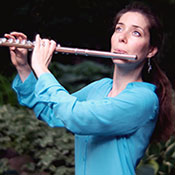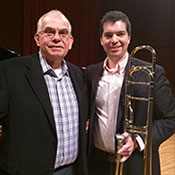
MSO Musician Spotlight: Beth Breslin
David Lewellen
PUBLISHED
Tagged Under: MSO Musicians, Musician, Viola
Beth Breslin’s orchestral past has made her appreciate the Milwaukee Symphony more.
Breslin, a member of the viola section since 2016, spent three years in the New World Symphony, the renowned training orchestra for young musicians in Florida. She played a year and a half in the San Antonio Symphony, and substituted with the Houston Symphony, before winning the Milwaukee audition.
“I didn’t know anything about Milwaukee, and I had never been here,” she says. But listening to a few concerts before she officially joined, “I was blown away by what I heard.”
In the New World Symphony, she said, “everyone is young and driven, and everyone plays on top of the beat. Most professional orchestras play a little bit behind. You can’t duplicate that energy. Everyone’s excited and no one’s jaded.”
But that energy isn’t sustainable over decades. In San Antonio, she was working with older musicians and got the perspective that “this is your career; this is the long game.” Another practical advantage was that “I learned a lot about the industry – negotiations, balance with management.”
In the MSO, Breslin currently serves on both the Artistic Liaison Committee and the Players’ Council. Both groups are elected by musicians to represent their interests. The Artistic Liaison Committee provides feedback on guest soloists, conductors, acoustics, repertoire, and other musical matters. “Management really does try to collaborate and make it the best artistic quality,” she said.
The Players’ Council negotiates a new musicians’ contract every several years, ensures that the contract is followed, and looks after operational matters. For Breslin, an important policy issue is making sure that string players get enough time off. A number of retirements, plus the pandemic’s two-year pause on auditions, have left many sections below full strength, and playing louder increases a string player’s risk of injury.
Breslin herself missed six months of the past season after she broke her right thumb in a car accident. She worked with an occupational therapist to regain the motion in her bow hand, but is still trying to limit her workload. She is taking this year off from the Grant Park Symphony in Chicago, which was her regular summer job before the pandemic.
That injury “plays into Beth’s concern for other individuals,” says John Thevenet, the MSO’s bass trombonist, who is currently vice president of the Players’ Council. “What comes first for her are individual players and their health and satisfaction. She’s passionate about making sure everyone’s voice is heard. You can’t have 70 people going to the CEO or the music director, so they come to these committees.”
Breslin grew up in New Jersey in a non-musical household, took a Suzuki violin class as a child, and happily switched to viola soon afterward. “Violin was too squeaky,” she remembers, “and I liked the role of the inner voices. It’s the best of all worlds. You get some melodies, and there are some parts that you might not know are there, but you’d miss them if they weren’t there.”
She now lives in Mequon with her fiancé, Kevin Kiefer, a research associate at Northwestern Mutual; they plan to get married in September, one week before the MSO season starts. The couple enjoys biking, doubles tennis, and playing with their dog and cat.
As a teenager, “I hated school and I liked chamber music, so I thought I would apply to a music school,” she says frankly. “I never heard a professional orchestra in my life until two years into college.” She wound up at the prestigious Oberlin Conservatory, “found my niche,” and shifted her focus to taking orchestra auditions. “I view an orchestra like a giant chamber ensemble,” she says. “It’s better for an orchestra when people do that. You don’t feel like a cog in the wheel.”
Feeling like a cog is an occupational hazard for section string players, but Breslin says, “We have more freedom to explore sound colors than people realize. There’s so much beyond loud and soft. Should it be silvery, or meaty, or lush? Even a piece you’ve played a million times will be different depending who’s on the podium or what group you’re in. And in the Bradley Symphony Center, you can hear all those subtleties.”



